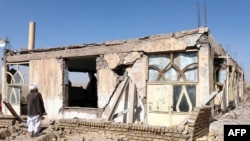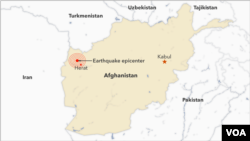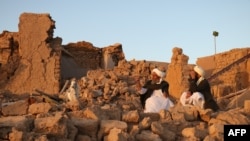Officials in Afghanistan say the death toll from a powerful earthquake that shook western parts of the country on Saturday has risen to more than 2,000.
The Taliban-led Ministry of Natural Disasters confirmed the death toll in a statement Sunday, saying more than 1,300 houses were completely destroyed in the quake.
Naeemul Haq, the head of the Taliban-led information and media center in Herat province, said in a statement that more than 2,000 people were injured in the magnitude 6.3 quake. He added that rescue operations continued and said the number of victims is expected to increase further.
Watch related video by Arash Arabasadi:
The earthquake struck Herat, a western province bordering Iran, at about 11 a.m. Saturday morning. Its epicenter was located near Zinda Jan, a district in central Herat.
At least eight powerful aftershocks rattled the province within five hours and affected villages across three districts, the U.N. Office for the Coordination of Humanitarian Affairs said. It described as serious the condition of many of those injured.
Taliban officials told a meeting of humanitarian organization representatives Sunday that the calamity had flattened more than a dozen villages housing around 3,000 families.
The United Nations in an initial overnight assessment reported that more than 600 houses "were partially or fully damaged" in the disaster zone.
"At least 4,200 people [600 families] have been affected. Additionally, an estimated 300 families, or 2,100 people, are reported to have been displaced," the U.N. Office for the Coordination of Humanitarian Affairs said.
"In coordination with the health authorities, the World Health Organization Country Office in Kabul and the WHO Field Office in Herat rapidly mobilized resources and extended immediate life-saving support for the affected population," the statement said.
U.N. Secretary-General Antonio Guterres expressed sadness at the loss of life in the earthquake, asserted his solidarity with the Afghanistan people, and extended “his sincere condolences to the families of the victims and wishes a swift recovery to those injured.”
The rest of statement released by Stephane Dujarric, secretary-general spokesman, read, “The United Nations and our partners in Afghanistan are coordinating with the de facto authorities to swiftly assess needs and provide emergency assistance.
“As winter approaches, the Secretary-General calls on the international community to come together and support people impacted by the earthquake, many of whom were already in need before this crisis.”
In June 2022, a powerful earthquake in the eastern parts of the impoverished South Asian nation killed more than 1,000 people.
Afghanistan has faced prolonged conflict and natural disasters, including flooding, drought and earthquakes, leading to one of the world's largest humanitarian crises. The U.N. estimates that two-thirds of the country's population is in need of aid.
The hardline Taliban seized control of the country two years ago. They imposed sweeping restrictions on women's access to education and work per their strict interpretation of Islamic law. The de facto rulers have also barred women from working for aid groups, hampering humanitarian activities in Afghanistan.
No country has recognized the Taliban government, citing human rights concerns and their treatment of women.









